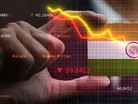Deloitte: Gradual economic rebound of India

Can India turn a crisis into an opportunity and emerge stronger on the other side of the pandemic? Is the question posed by consultants Deloitte who look at how the Asia Pacific country is navigating its way through the challenges set by COVID-19.
“With adversity, comes opportunity,” comments author Dr Rumki Majumdar, associate director economist Deloitte India. “As policymakers and businesses respond to this crisis, they will require resilience to prepare for uncertainties in the months ahead to recover, and then, thrive. It’s important to understand the emerging new norms and tap into opportunities that these trends present.”
Outlined in the report: A long winding uncertain road to recovery, Deloitte focuses on how India is starting to gradually re-bound from the pandemic (despite a contraction never seen before), global influences on the export market and how government support will aid recovery.
It is reported that India’s economy was slowing prior to the pandemic. “And then came COVID-19, causing the GDP to decline by 23.9% year over year in the first quarter (April to June) of FY2021 - the largest GDP contraction recorded in a quarter since India began reporting quarterly data (in the mid-1990s).” commented Majumdar.
According to the report, supply-chain disruptions and closure of factories and industries led to a reduction in gross fixed capital investment by 47.1%, private consumer spending also fell by 26.7%. Exports reduced by 19.8% which had been contracting for over four quarters.
But the drop in imports was even more severe (by 40.4%) compared to exports primarily due to falling domestic demand and oil prices.
“The government intensified its effort to cushion the economy from the impact of the pandemic and announced economic stimulus packages. Consequently, the government's final consumption expenditure increased by 16.4% as it incurred unplanned spending,” says the report.
How India’s economy contracted during the crisis
- Trade, hotels, transport, communication contracted by 47% and show no signs of revival due to intermittent lockdowns and social distancing.
- The financial, real estate and professional services sector declined by 5.3% due to supply disruptions adding stress on lenders’ balance sheets and remote work affecting professional services.
- The public administration, defence, and other services fell by 10.3% due to higher spending on health care services and support to disadvantaged sections of the population.
- Non-farm private sector GVA (excluding contribution from agriculture and government services) shrunk by 29.6% in Q1 FY2020.
A gradual economic rebound is predicted in the paper. According to Deloitte’s consumer behaviour survey, uncertainties around employment and financial anxieties have reduced spending among Indian consumers on discretionary goods.
“Lower demand is translating into constrained business investment in capital projects and delay in hiring, thereby creating a vicious circle of low demand and supply. Low confidence among consumers and businesses will likely keep the economic rebound gradual,” commented Majumdar
Rocky road to recovery
India’s economic revival will depend on the following factors:
- How long the pandemic lasts
- Availability of treatment and vaccines
- Overcoming a climate of caution and anxiety relating to health, employment and finances
- Change in consumer behaviour and demand patterns
- Impact of global growth on trade and demand
- Automation of business models
“Within India, rural demand may hold up for some time because of a good monsoon and the government’s support to provide employment opportunities in rural areas. In contrast, the increasing levels of infection in urban areas may keep demand subdued.
That said, the oncoming festival months may generate enough demand to keep the wheels of the economy moving till the end of the year,” says Majumdar.
Deloitte predicts the government’s two stimulus packages of over 10% of GDP to help the country respond to the crisis will be crucial in reducing the pandemic’s impact on the economy – but stress it will help in the short term but may not be enough for long term recovery.
Opportunity from adversity
Deloitte pose the question: Is this crisis an opportunity for India to switch gears? “For policymakers, this could be the opportunity to increase capital spending to boost productivity, create assets, and monetise those assets to generate revenue.
This could include:
- Scale up its physical and social infrastructure significantly to compete with its global peers.
- Spend on infrastructure and health care will likely address the demand uncertainty challenge, thereby generating employment for low-skilled employees.
- Improve private sector performance and increasing activity among small and medium enterprises.
- Investment in improving the skill base and in emerging opportunities such as digitisation and consolidation to improve productivity and address new markets.
- Rethink sourcing plans and reorganise supply chains for industries to reduce risks.
“In terms of long-term measures, the government has to maintain the reform momentum that strengthens the institutional structure to improve efficiency and transparency. By addressing structural logjams (related to environmental and other regulatory clearances), complicated tax processes, labour challenges, land acquisition, etc, the government can attract investors who are looking for alternate manufacturing destinations to diversify their supply chains and reduce costs, commented Majumdar.
Thriving in post-pandemic times will require policymakers, businesses, and investors to demonstrate resilience and the ability to convert challenges into opportunities, now, concludes the report.
For more information on business topics in Asia Pacific, Australia and New Zealand, please take a look at the latest edition of Business Chief APAC.
- Top 10 largest companies in India (and how they got there)Corporate Finance
- How incoming CEO Mohit Joshi is restructuring Tech MahindraCorporate Finance
- IndiGo – the high-flying Indian low-cost airlineSustainability
- Why Kotak Mahindra Bank has appointed an outsider as CEOLeadership & Strategy



